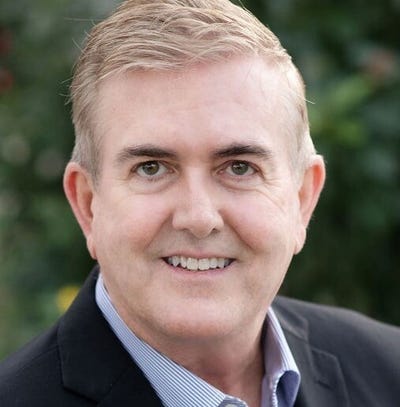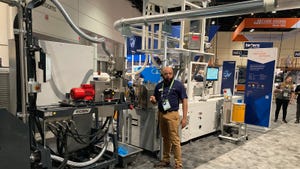Why your company can’t land a rock star
October 5, 2016

Back in the day, finding the top people in any field used to be really hard. I’m not talking about attracting, hiring or retaining them—just finding them was hard. But technology and data, moving at blinding speed, have changed all that. In 2008, LinkedIn surpassed 10 million members. By 2011 that number was over 100 million, and in 2017 it will approach 500 million. And that is just one way to find people. Unless you’re in a witness protection program, you can be found online in a matter of seconds.
So what’s my point? Finding top talent in the plastics industry is actually easy. The question is, why can’t you hire them? CAUTION: What follows is not for the squeamish. You may find yourself going through the five stages of hiring grief when reading this: Denial, anger, bargaining, depression and, hopefully in the end, some measure of acceptance.
|
Image courtesy sheelamohan/freedigitalphotos.net. |
First, hiring a key person isn’t really as important to most companies as they claim. If it is, you will have a written plan for how and where you are going to find the candidates you want to attract; a schedule for when you are going to have interviews; a list of who will be involved in each interview with their availability confirmed; and the agenda for the interview. This would include the final decision makers. You won’t do this—most don’t—but you should. Realizing that the top performers are interviewing you at least as much as you are interviewing them in today’s environment, the plan would include your presentation on where the company is headed, exciting new initiatives and a capture strategy for making an offer that will be accepted. The plan would include every detail from where the candidate will stay if out of town and transportation to where you will take them to dinner. (Oh no, you don’t take them to dinner?)
The second reason companies can’t hire the top talent is they are too slow. Waaaaay too slow. Time kills deals, just ask anyone in your sales department. Does this sound about right: Your company finds someone you’d like to interview, and he or she wants to interview with your company. You might be reluctant to even schedule the interview until you have three candidates, because someone told you long ago that you should interview at least three candidates. A week or two later you have a 45-minute phone conversation. It goes well, and you’re thinking we should get this person in for a face-to-face interview. Now all you need to do is find a half day on the calendar when each of four or five extremely busy people are all available at the same time. Hmmm, that could be quite a while, but let’s say you find some time next month, on Thursday morning of the second week. The marginal candidate might find a way to tell their boss they need to take off on a random Wednesday and Thursday. The good ones will say something like, “I’ve thought about this further and don’t feel like it would be a step forward for me.” You’ll rationalize that if that’s how they feel you didn’t want them anyway. Yes, you did, but they lost interest in you because you’re moving like a snail and that’s unattractive.
Reason number three is companies do not know how to sell themselves to top performers. They know how to sell their products or services to potential clients and their financial condition to their banker, but not the company as a place to work. When a top sports star becomes a free agent and teams have them in, do you think they have them wait in the lobby, sit them in a conference room, offer them coffee and start by saying, “So, tell me why you want to come and play for us?” They don’t make an offer to every player that they have visit, but they understand that they want the great players to want to play for them, so that if they are, in fact, a good fit they will accept an eventual offer with enthusiasm. Team management will talk about how they did last year, the improvements they are making to the practice facilities, a new coach they just brought on, how good some of the other players are to play with, and so on. I would suggest starting every professional interview by making a presentation. I’ve been with my kids on many college visits and they all start with a presentation, including an exciting video of how great the school is. Ultimately, they may not even accept my kid, but they want that to be their option. Oh, and if there really isn’t anything compelling about your company, that’s fine but forget about landing a truly top performer—you won’t be able to fool them.
Lastly, and this is a big one, the millennial candidates (the 25 to 38 year olds, for the purposes of this article) that you really want to target don’t trust you or your company. Unlike the baby boomers, who grew up with a certain level of trust in institutions like the government, big corporations, schools and organized religion, millennials don’t see a reason to trust anyone. There is a 50/50 chance that their parents are divorced, they probably have a parent who has been “downsized” or “re-engineered” out of a good job, they’ve seen wars they don’t understand and they’ve lost all faith in government (Congress’s approval rating has ranged from 10 to 20% over the past few years). The employer/employee “social contract” used to mean a good employer took care of you, and if you did a good job you were set for life. Baby boomers might miss those days, but understand that they are gone. The millennials grew up with that reality, so even if you are a company with what you believe is a prestigious pedigree, they don’t trust you.
They desperately want to trust someone, but you have a lot of work to do to earn that trust, starting with understanding what they want. Many studies have been done of millennials to see what is important to them. When compared side-by-side with what most employers think is important, the correlation is almost the opposite. Prestige, power, salary and so on, the things that are important to boomers, rank near the bottom of the list for millennials. They are looking for things like flexible hours, relationships with colleagues and interesting work.
The main point to remember in all this is that unemployment among the top professionals isn’t zero, it’s negative, meaning there are more openings than there are qualified candidates. We are in a candidate-driven market: We have been in one for several years, and we will be for the next 10 to 15 years. The really good candidates are in charge. The companies that are actually hiring these people away from their competitors are listening to what is important to them, and meeting them at least half way. Are you thinking that your company just can’t do that? Sounds like hiring someone really isn’t that important . . . .
Paul Sturgeon is business manager for KLA Industries, the largest plastics recruiting firm in the United States. Its clients include the most innovative and fastest growing leaders in the plastics industry. To learn more about KLA, visit its website at www.klaindustries.com.
About the Author(s)
You May Also Like




